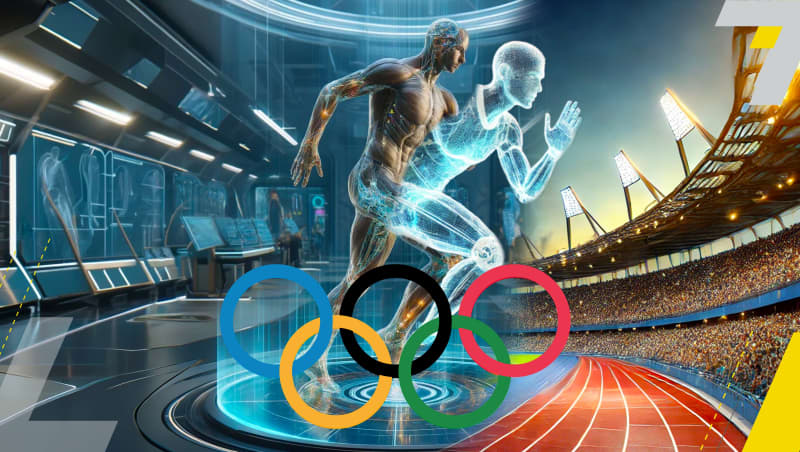Next in our blog series, the Paris 2024 Olympic games. With the games kicking off last week, there’s no better time to explore how artificial intelligence is helping to transform the experience of the games for athletes, spectators and officials.
How AI Is Transforming The Paris 2024 Olympics
Artificial intelligence (AI) is seamlessly integrating into every aspect of our lives, and the Paris 2024 Olympics are no exception. From identifying potential future Olympians to enhancing security and sustainability, AI is playing a pivotal role in transforming how the games are conducted and experienced.
Spotting Future Olympic Talent
One of the most exciting applications of AI at the Paris 2024 Olympics is its ability to identify potential athletic talent. Intel, the Official AI Platform Partner for Paris 2024, has introduced a groundbreaking tool at the Stade de France that helps determine which sports participants are best suited for based on their physical attributes and abilities.
Visitors to the Intel stand undergo a series of tests that measure their body metrics, reaction times, strength, and agility. This includes running on the spot, squeezing devices, and responding to flashing lights. The data collected is then analysed by AI to match participants with the sport they are most suited for from a selection of 12 sports, including football, sprinting, and table tennis.
This technology is not just for spectators, but has the potential to identify future Olympic talent globally, especially in developing nations. A pilot version of this technology was tested in Senegal, where it helped identify 48 high-performing young athletes who are now part of a development program run by the Senegalese National Olympic Committee. According to Sarah Vickers (Head of Intel’s Olympic and Paralympic Office), this technology can “find athletes in all corners of the world and for all sports” and at a very low cost (Technology Magazine) (Paris 2024 Olympics).
Preventing Cyber Abuse Towards Athletes
Sports and social media are closely connected, with an anticipated half a billion social media posts covering the 2024 Olympic Games expected in the coming weeks. To safeguard athletes and officials from online abuse, a new AI system has been developed. The system will monitor social media in real-time assessing multiple languages to flag abusive content, often before athletes and officials see it. This initiative is part of the IOC’s broader commitment to safe sports, aiming to ensure both physical and digital environments are secure and allowing athletes to focus on their performance and well-being.
Enhancing Security
Security is a major concern for any large event, and the Paris 2024 Olympics are no exception. AI is being deployed to enhance security measures, particularly through AI-powered video surveillance. These systems can monitor crowds in real-time and detect unusual behaviour that might indicate potential security threats such as unattended bags or suspicious activities. This proactive approach aims to prevent incidents like crowd crushes or terrorist attacks, ensuring the safety of all attendees (The Nation).
Promoting Sustainability
Smart systems powered by AI are helping to optimise energy usage across venues, reduce waste, and manage resources more efficiently. The AI systems can predict energy needs based on weather patterns and event schedules, ensuring that only the necessary amount of power is used, helping to reduce the carbon footprint of the games.
Analysing The Competitions
AI’s role in the 2024 Olympic Games extends to the analysis of sporting competitions as well. By using machine learning and computer vision, AI can provide detailed insights into athletes’ performances. This includes tracking movements, analysing techniques, and providing feedback that can help athletes improve their performance. For judges, this offers objective assessments that reduce the risk of human error and bias, allowing a fairer competition outcome.
Enhancing Spectator Experience
These AI advancements for the analysis of athlete performance also help to improve the overall fan experience by providing real-time analytics and interactive insights during the games. AI is also enhancing the overall experience for spectators with real-time translation services. The AI powered services are being used to display information in multiple languages on screens, making the events more accessible to a global audience. This technology ensures that language barriers do not hinder the enjoyment of the games, allowing people from all over the world to follow along seamlessly.
Conclusion
The integration of AI into the Paris 2024 Olympics is a testament to how technology can transform traditional practices and elevate the overall experience for athletes, spectators, and officials. From identifying future talent to ensuring sustainability and preventing online abuse, AI is playing a crucial role in making the Paris 2024 Olympics a groundbreaking event. As these technologies continue to develop, they promise to bring even more innovations to the world of sports and beyond.




